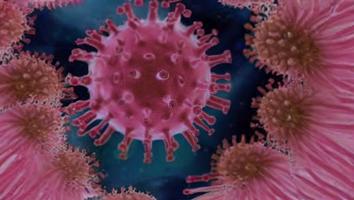Rapid COVID Antibody Test Can Reveal Immune Status in 15 Minutes
 3 years ago
By Charlotte Di Salvo
3 years ago
By Charlotte Di Salvo

As of July 2021, the number of hospitalisations and deaths due to COVID-19 have significantly dropped since the second peak around January this year. In addition to restrictions, the greatest contributor to this drop has been the rapid vaccine uptake in the population.
Two doses of the vaccine have shown to be critical in providing optimum protection against severe cases: a study of 8,517 adults in England and Wales by University College London’s Virus Watch project found that 96.4% of people who had either of the vaccines had developed antibodies 28 to 34 days after their first dose, rising to 99.08% within seven to 14 days of the second dose.
According to an article published 26 July 2021, UK-based company Luas Diagnostics launched a rapid test which detects the presence of SARS-CoV-2-targeting antibodies in the blood. While this is one of many antibody tests on the market, this particular test has been designed to differentiate between different antibodies present in the body, providing more information about the immune response to COVID-19.
The test uses Chembio’s dual-path-platform (DPP) immunochromatographic technology. Immunochromatographic technology, also known as lateral flow tests, are an integral part of COVID-19 antigen tests. A typical lateral flow test format consists of a “filter paper membrane that transports the liquid sample from the application pad via conjugate release pad along a strip”.
The identification and detection is based on an antigen-antibody immune reaction. When an immunocomplex with an “immobilised detection antibody is formed, if gold or latex particles are used as conjugates, a red-purple or blue line, respectively, is generated”. The main advantages of this method includes rapid detection of the antigen in question, low sample volume, portable devices and inexpensive equipment.
The DPP system consists of a sample path that distributes a small volume of sample onto an antibody detection strip containing a test line for LPS (lipopolysaccharide), a test line for HlyE (Salmonella enterica serovar Typhi hemolysin E), and a control line. LPS and HIyE specifically refer to a study discriminating patients with acute typhoid from healthy controls. The sample can be whole blood, plasma or serum.
The DPP uses “a portable, battery-powered instrument using assay-specific algorithms to verify the presence of the control line and displays a numerical intensity value for each test line”.
One of the main advantages for the test is the minimal training required for health professionals in addition to only taking 15 minutes to produce a result. In addition, the design of the device minimises the chance of human interpretation error which makes it perfect for use in non-clinical settings like homes and schools.
Antibody detection
The antibody tests currently available on the market can detect antibodies produced in response to COVID-19 but cannot differentiate whether this is due to initial exposure or as a result of vaccination.
The new rapid test developed by, originally developed by US manufacturer Chembio Diagnostics, can differentiate between two types of immunoglobulins, known as IgM (Immunoglobulin M) and IgG (Immunoglobulin G), which clarifies whether the antibodies produced are in response to a recent infection or a vaccine dose.
Immunoglobulins form part of the immune response and are proteins produced by plasma cells in response to pathogens and exposure to other harmful substances. IgM and IgB are two of the five main classes of immunoglobulins, each representing a group of antibodies with slightly different roles.
IgM antibodies are produced in the initial response to a new infection or new foreign antigen, which provides short-term protection. ImG antibodies, on the other hand, remain in the body for a longer period of time after infection. After the initial infection, memory cells retain copies of IgG antibodies used to fight the pathogenic antigen in order to rapidly produce the same antibodies in the future should the pathogen re-enter the body.
Therefore, identification of ImG levels in the body is key to assess the success of vaccines in producing the antibodies which provide long-term protection against pathogens – in this case COVID-19.
Future impact
Whilst there is little news regarding the implementation of these rapid antibody tests, it has been suggested that they could provide the basis on deciding when/where booster shots will be deployed. Continuous testing of the vulnerable population especially will be useful to assess the long-term protection from the vaccines, as this will be the first group to receive booster shots.
As of now, the consensus across regulatory bodies, academia and some governments is that there is very little evidence to suggest the rapid implementation of COVID-19 booster shot programmes.
Part of the problem is the interpretation of complex data from various clinical studies and agencies across the globe, with conflicting results regarding the protection of the different vaccines against the delta variant.
For example, real-world data from Canada has shown 82% and 87% effectiveness after one dose against hospitalisation or death caused by Beta/Gamma and Delta variants respectively, according to AstraZeneca. However, data from the UK (against delta) show that for protecting against hospitalisation, AstraZeneca is 71% effective after one dose, and 92% effective after two doses.
With an increasing number of clinical trials investigating potential booster shots and those assessing the efficacy of vaccines against variants, the data to come will no doubt determine the direction of the COVID-19 pandemic.
Charlotte Di Salvo, Lead Medical Writer
PharmaFeatures
For more articles covering the pharmaceutical industry, clinical research and academia, visit our content site PharmaFeatures.

Navigating the Complex World of Global Regulatory Affairs in Oncology
In today's fast-paced global pharmaceutical landscape, the regulatory affairs sector plays a pivotal role in ensuring the safety, efficacy, and market access of oncology drugs. As the demand for innovative cancer therapies continues to grow, understanding the intricacies of global...
8 months agoNavigating the Complex World of Global Regulatory Affairs in Oncology
In today's fast-paced global pharmaceutical landscape, the regulatory affairs sector plays a pivotal role in ensuring the safety, efficacy, and market access of oncology drugs. As the demand for innovative cancer therapies continues to grow, understanding the intricacies of global...
8 months ago
Overcoming the Hurdles: Navigating the Challenges in Oncology Clinical Trials
In the world of medical research, oncology clinical trials are at the forefront of innovation and discovery. These trials play a crucial role in advancing our understanding of cancer and developing more effective treatments. However, the path to successful oncology...
8 months agoOvercoming the Hurdles: Navigating the Challenges in Oncology Clinical Trials
In the world of medical research, oncology clinical trials are at the forefront of innovation and discovery. These trials play a crucial role in advancing our understanding of cancer and developing more effective treatments. However, the path to successful oncology...
8 months ago
Embracing a Patient-Centric Approach in Oncology Trials
In the realm of healthcare and medical research, the term "patient-centric" has gained significant traction in recent years. This shift in focus towards prioritizing patients' needs and preferences is not only transforming the healthcare industry but is also making waves...
8 months agoEmbracing a Patient-Centric Approach in Oncology Trials
In the realm of healthcare and medical research, the term "patient-centric" has gained significant traction in recent years. This shift in focus towards prioritizing patients' needs and preferences is not only transforming the healthcare industry but is also making waves...
8 months ago